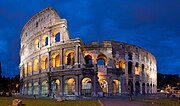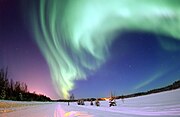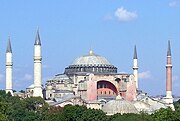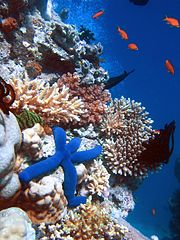Wonders of the World
From Wikipedia, the free encyclopedia
Various lists of the Wonders of the World have been compiled over the ages to catalogue the most spectacular man-made constructions and natural things in the world.
The Seven Wonders of the Ancient World is the first known list of the most remarkable man-made creations of classical antiquity, and was based on guide-books popular among Hellenic sight-seers and only includes works located around the Mediterranean rim. The number seven was chosen because the Greeks believed it to be the representation of perfection and plenty.[1] Many similar lists have been made, including lists for the Medieval World and the Modern World.
Contents
|
Seven Wonders of the Ancient World

The Great Pyramid of Giza, the only wonder of the ancient world still in existence

The Colosseum in Rome

The Aurora Borealis or Northern Lights

The London sewerage system's original Abbey Mills pumping station
|
The historian Herodotus (484 BC–ca. 425 BC), and the scholar Callimachus of Cyrene (ca 305–240 BC) at the Museum of Alexandria, made early lists of Seven wonders but their writings have not survived, except as references. The seven wonders included:
- Great Pyramid of Giza
- Hanging Gardens of Babylon
- Statue of Zeus at Olympia
- Temple of Artemis at Ephesus
- Mausoleum of Maussollos at Halicarnassus
- Colossus of Rhodes
- Lighthouse of Alexandria
The earliest lists had the Ishtar Gate as the seventh wonder of the world instead of the Lighthouse of Alexandria.
The Greek category was not Wonders but "thaumata"(Greek: Θαύματα), which translates closer to "miracles". The list that we know today was compiled in the Middle Ages—by which time many of the sites were no longer in existence. Today, the only ancient world wonder that still exists is the Great Pyramid of Giza.
Wonders of the Medieval World
Many lists of wonders of the world are said to have existed during the Middle Ages, although it is unlikely that these lists originated at that time because the word medieval was not even invented until the Enlightenment-era, and the concept of a Middle Age did not become popular until the 16th century. Brewer's refers to them as "later list[s]"[2] suggesting the lists were created after the Middle Ages.
Many of the structures on these lists were built much earlier than the Medieval Ages, but were well known.[3] These lists go by names such as Wonders of the Middle Ages (implying no specific limitation to seven), Seven Wonders of the Middle Ages, Medieval Mind and Architectural Wonders of the Middle Ages.
Typically representative of the seven greatest wonders of the Medieval world are:[2][3][4][5]
- Stonehenge
- Colosseum
- Catacombs of Kom el Shoqafa
- Great Wall of China
- Porcelain Tower of Nanjing
- Hagia Sophia
- Leaning Tower of Pisa
Other sites included on such lists:
Wonders of the modern world
Many lists have been made of the greatest structures built during modern times or of the greatest wonders existing today. Some of the most notable lists are presented below.
American Society of Civil Engineers
The American Society of Civil Engineers compiled a list of wonders of the modern world:[10]
| Wonder | Date Started | Date Finished | Locations |
|---|---|---|---|
| Channel Tunnel | December 1, 1987 | May 6, 1994 | Strait of Dover, between the United Kingdom and France |
| CN Tower | February 6, 1973 | June 26, 1976, tallest freestanding structure in the world 1976-2007. | Toronto, Ontario, Canada |
| Empire State Building | January 22, 1930 | May 1, 1931, Tallest structure in the world 1931-1967. First building with 100+ stories. | New York, NY, U.S. |
| Golden Gate Bridge | January 5, 1933 | May 27, 1937 | Golden Gate Strait, north of San Francisco, California, U.S. |
| Itaipu Dam | January 1970 | May 5, 1984 | Paraná River, between Brazil and Paraguay |
| Delta Works | 1950 | May 10, 1997 | Netherlands |
| Panama Canal | January 1, 1880 | January 7, 1914 | Isthmus of Panama |
New 7 Wonders Foundation's seven wonders of the world
In 2001 an initiative was started by the Swiss corporation New7Wonders Foundation to choose the New Seven Wonders of the World from a selection of 200 existing monuments for profit.[11] Twenty-one finalists were announced January 1, 2006.[12] Egypt was not happy with the fact that the only original wonder would have to compete with the likes of the Statue of Liberty, the Sydney Opera House, and other landmarks; and called the project absurd. To solve this, Giza was named an honorary Candidate.[13] The results were announced on July 7, 2007 in Benfica's stadium in a big ceremony in Lisbon, Portugal,[14] and are listed here:
| Wonder | Date of construction | Location |
|---|---|---|
| Great Wall of China | 5th century BCE – 16th century CE | China |
| Petra | Unknown | Jordan |
| Christ the Redeemer | Opened 12 October 1931 | Brazil |
| Machu Picchu | c.1450 | Peru |
| Chichen Itza | c.600 | Mexico |
| Roman Colosseum | Completed 80 CE | Italy |
| Taj Mahal | Completed c.1648 | India |
| Great Pyramid (Honorary Candidate) | Completed c.2560 BCE | Egypt |
USA Today's New Seven Wonders
In November 2006 the American national newspaper USA Today in conjunction with the American television show Good Morning America revealed a list of New Seven Wonders as chosen by six judges.[15] The wonders were announced one per day over a week on Good Morning America. An eighth wonder was chosen on November 24 from viewer feedback.[16]
| Number | Wonder | Location |
|---|---|---|
| 1 | Potala Palace | Lhasa, Tibet, China |
| 2 | Old City of Jerusalem | Jerusalem, Israel |
| 3 | Polar ice caps | Polar regions |
| 4 | Papahānaumokuākea Marine National Monument | Hawaii, United States |
| 5 | Internet | N/A |
| 6 | Maya ruins | Yucatán Peninsula, México |
| 7 | Great Migration of Serengeti and Masai Mara | Tanzania and Kenya |
| 8 | Grand Canyon (viewer-chosen eighth wonder) | Arizona, United States |
Seven Natural Wonders of the World
Similar to the other lists of wonders, there is no consensus on a list of seven natural wonders of the world, as there has been debate over how large the list should be. One of the many lists was compiled by CNN:[17]
- Grand Canyon
- Great Barrier Reef
- Harbour of Rio de Janeiro
- Mount Everest
- Aurora
- Parícutin volcano
- Victoria Falls
New7Wonders of Nature is a contemporary effort to create a list of seven natural wonders chosen by people through a global poll, organized by New Open World Corporation (NOWC), which ran the New Seven Wonders of the World campaign.
Seven Natural Wonders:[18] is a not for profit endeavour created to protect the seven natural wonders that have already been established.
Seven Wonders of the Underwater World
The Seven Underwater Wonders of the World was a list drawn up by CEDAM International, an American-based non-profit group for divers, dedicated to ocean preservation and research.
In 1989 CEDAM brought together a panel of marine scientists, including Dr. Eugenie Clark, to pick underwater areas which they considered to be worthy of protection. The results were announced at The National Aquarium in Washington DC by actor Lloyd Bridges, who played in a TV show titled Sea Hunt:[19] [20]
- Palau
- Belize Barrier Reef
- Great Barrier Reef
- Deep-Sea Vents
- Galápagos Islands
- Lake Baikal
- Northern Red Sea
Seven Wonders of the Industrial World
British author Deborah Cadbury wrote Seven Wonders of the Industrial World, a book telling the stories of seven great feats of engineering of the nineteenth and early twentieth centuries. In 2003 the BBC made a seven-part documentary series on the book, with each episode dramatising the construction one of the wonders. The seven industrial wonders are:
- SS Great Eastern
- Bell Rock Lighthouse
- Brooklyn Bridge
- London sewerage system
- First Transcontinental Railroad
- Panama Canal
- Hoover Dam
Travel wonders of the world
Travel writer Howard Hillman is one of many who have compiled lists of the top man-made[21] and natural[22] tourist travel wonders of the world:
Man-made travel wonders
- Giza pyramid complex
- Great Wall of China
- Taj Mahal
- Machu Picchu
- Bali
- Angkor Wat
- Forbidden City
- Bagan Temples & Pagodas
- Karnak Temple
- Teotihuacán
Natural travel wonders
- Serengeti Migration
- Galápagos Islands
- Grand Canyon
- Iguazu Falls
- Amazon Rainforest
- Ngorongoro Crater
- Great Barrier Reef
- Victoria Falls
- Bora Bora
- Cappadocia
See also
- Eighth Wonder of the World
- World Heritage List - a list of over 800 sites deemed by UNESCO to be of "outstanding universal value"
- National lists of Seven Wonders
- Seven Wonders of Fore (Fore Abbey, Ireland)
- Seven Blunders of the World — a list by Mahatma Gandhi
References
- ^ Anon. (1993)The Oxford Illustrated Encyclopedia First Edition Oxford:Oxford University
- ^ a b I H Evans (reviser), Brewer's Dictionary of Phrase and Fable (Centenary edition Fourth impression (corrected); London: Cassell, 1975), page 1163
- ^ a b Hereward Carrington (1880-1958), "The Seven Wonders of the World: ancient, medieval and modern", reprinted in the Carington Collection (2003) ISBN 0-7661-4378-3, page 14.
- ^ Edward Latham. A Dictionary of Names, Nicknames and Surnames, of Persons, Places and Things (1904), page 280.
- ^ Francis Trevelyan Miller, Woodrow Wilson, William Howard Taft, Theodore Roosevelt. America, the Land We Love (1915), page 201.
- ^ Palpa, as You Like it, page 67)
- ^ The Complete Idiot's Guide to the Crusades (2001, page 153))
- ^ The Rough Guide To England (1994, page 596))
- ^ The Catholic Encyclopedia, v.16 (1913), page 74
- ^ American Society of Civil Engineers Seven Wonders
- ^ New Seven Wonders
- ^ Finalist Page
- ^ Egypt Angered at New Wonders Idea
- ^ Reuters via ABC News Australia "Opera House snubbed as new Wonders unveiled" 7 July 2007
- ^ New Seven Wonders panel
- ^ The world's 8th wonder: Readers pick the Grand Canyon
- ^ CNN Natural Wonders
- ^ Seven Natural Wonders
- ^ Underwater Wonders of the World
- ^ 2nd list of Underwater Wonder
- ^ Hillman, Howard. "World's top 10 man-made travel wonders". Hillman Quality Publications. http://www.hillmanwonders.com/top10/man_made.htm#_vtop. Retrieved on 2007-07-07.
- ^ Hillman, Howard. "World's top 10 natural travel wonders". Hillman Quality Publications. http://www.hillmanwonders.com/top10/natural.htm#_vtop. Retrieved on 2007-07-07.
Further reading
- Ash, Russell, "Great Wonders of the World". Dorling Kindersley. 2000. ISBN 978-0751328868
- Cox, Reg, and Neil Morris, "The Seven Wonders of the Modern World". Chelsea House Publications: Library. October 2000. ISBN 0-7910-6048-9
- Cox, Reg, Neil Morris, and James Field, "The Seven Wonders of the Medieval World". Chelsea House Publications: Library. October 2000. ISBN 0-7910-6047-0
- D'Epiro, Peter, and Mary Desmond Pinkowish, "What Are the Seven Wonders of the World? and 100 Other Great Cultural Lists". Anchor. December 1, 1998. ISBN 0-385-49062-3
- Morris, Neil, "The Seven Wonders of the Natural World". Chrysalis Books. December 30, 2002. ISBN 1-84138-495-X
External links
- Seven Wonders of the Modern World - a list of modern wonders compiled by the American Society of Civil Engineers










